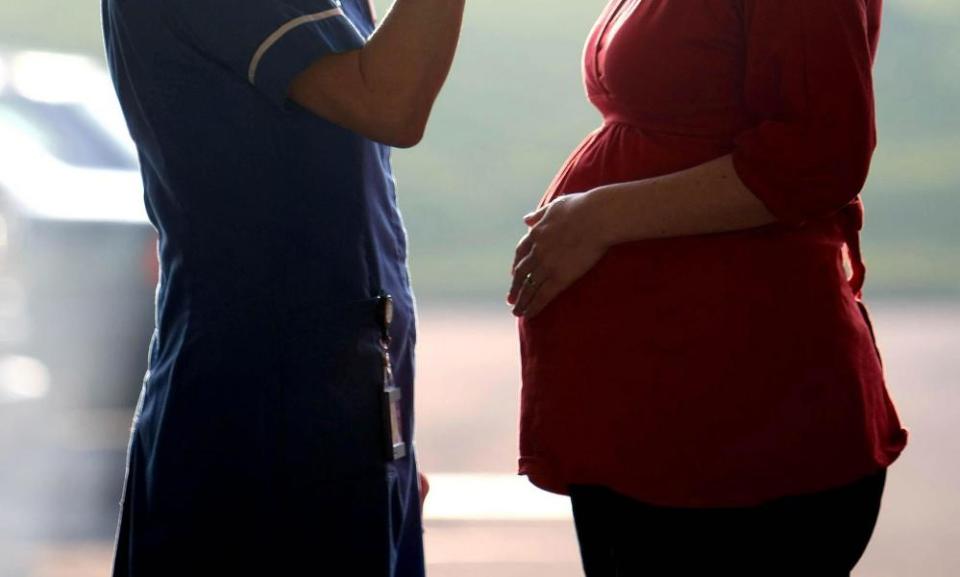Pregnant women urged to get Covid jab amid rise in hospital admissions

England’s top midwife is urging expectant mums to get the Covid-19 vaccine as soon as possible, as new data suggests a worrying rise in Covid-19 hospital admissions among unvaccinated pregnant women in the UK.
There is also evidence that the Delta variant poses a significantly greater risk to pregnant women than previous strains.
The data suggests that the overwhelming majority (98%) of 171 pregnant women hospitalised with coronavirus symptoms since mid-May had not received a Covid-19 vaccine, compared to just three women who had received a first dose, and no fully vaccinated pregnant women.
Prof Jacqueline Dunkley-Bent, chief midwifery officer for England, said: “Vaccines save lives, and this is another stark reminder that the Covid-19 jab can keep you, your baby and your loved ones safe and out of hospital.”
Although pregnant women are no more likely to catch Covid-19, they are already recognised to be at slightly increased risk of becoming severely unwell, or to experience complications such as preterm birth or stillbirth if they become infected.
Related: ‘Mixed advice’ driving Covid vaccine hesitancy in pregnant UK women
The new study draws on data collected by the UK Obstetric Surveillance System (UKOSS), which gathers information on severe pregnancy complications from all 194 UK hospitals with a consultant-led maternity unit.
It found that since 1 March 2020, 3,371 pregnant women have been admitted to hospital with Covid-19 symptoms – either as a precaution or because they have needed additional health support – and that the severity of their illness appears to have worsened with each successive wave of the pandemic.
About a quarter (24%) of those admitted during the first wave had moderate or severe disease, compared with 36% of those infected with the Alpha variant during the second wave. The latter group were also more likely to require respiratory support, have pneumonia, and be admitted to intensive care. Meanwhile, 45% of pregnant women admitted with the Delta variant have experienced moderate or severe disease, with an even greater proportion suffering from pneumonia.
In the last three months alone, one in three pregnant women in hospital with Covid-19 in England required additional respiratory support, with 37% developing pneumonia, and around one in seven requiring intensive care (15%).
Prof Marian Knight at the University of Oxford, who led the study, said: “It could be that [pregnant women] are simply getting a higher dose of virus, or due to the variant behaving differently. It could also be a reflection of clinician behaviour in that pregnant women are getting treated with more intensive care earlier than they were before, which is a good thing.”
The Delta variant has also been associated with more severe symptoms and an increased risk of hospitalisation among the general population.
The study, which has not yet been peer reviewed, also found that one in five women admitted to hospital with serious Covid symptoms went on to give birth prematurely, while the likelihood of delivery by caesarean section doubled.
Of the 742 pregnant women admitted to hospital with Covid-19 symptoms since 1 February, 99% had not been vaccinated.
Related: Covid jabs offered to pregnant women: your questions answered
In light of this data, Dunkley-Bent has written to midwives and GP practices across the country urging them to encourage uptake of the Covid-19 jab among pregnant women. She said: “We need everyone to come forward and take up the evergreen offer of a jab which is why I am calling on pregnant women to take action to protect themselves and their babies and on my fellow midwives to ensure they have the information they need to do so.”
In April, the Joint Committee on Vaccination and Immunisation (JCVI) advised that pregnant women should be offered the Pfizer and Moderna Covid-19 vaccines
A new survey of 6,267 pregnant women by campaigning group Pregnant Then Screwed found that 37% of pregnant women feel scared to leave the house now that Covid-19 restrictions have lifted, and 70% are limiting their interactions with others as much as possible. Nine out of 10 reported feeling scared for their safety.
The group said it had been inundated with stories of negative messaging given to pregnant women from healthcare professionals.
However, both the Royal College of Obstetricians and Gynaecologists (RCOG) and the Royal College of Midwives have recommended vaccination as one of the best defences for pregnant women against severe Covid-19.
Dr Edward Morris, president of the Royal College of Obstetricians and Gynaecologists, said: “Every day our members are seeing very sick pregnant women with Covid-19 in hospital and the majority are unvaccinated. We want to reassure pregnant women that Covid-19 vaccines are the safest and best way to protect you and your baby from severe illness and premature birth.”

 Yahoo Finance
Yahoo Finance 